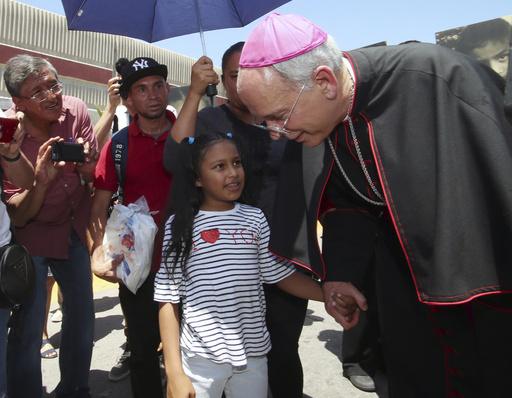
As U.S. Catholic bishops convene for their annual fall gathering this week in Baltimore, the influence of President-elect Donald Trump’s significant electoral victory looms large over their discussions.
The anticipated Trump administration presents both opportunities and challenges for Catholic leaders in America, especially regarding pivotal issues such as abortion and immigration.
Archbishop Timothy Broglio, the president of the U.S. Conference of Catholic Bishops, welcomed Trump’s victory in a statement that emphasized the Catholic Church’s stance of neutrality regarding political affiliations.
Catholic doctrine advocates for the abolition of abortion alongside compassionate treatment of migrants. Many Catholics, much like other Christians in the U.S., view Trump as an inconsistent figure who embodies certain values they hold dear.
While Trump has claimed credit for paving the way for the end of federal abortion rights, his stance on a nationwide abortion ban remains ambiguous, with statements suggesting that decisions should be left to individual states.
On the immigration front, however, his positions create greater concern among Catholic bishops. Trump has long campaigned on implementing strict immigration policies and has promised the most extensive deportation efforts in U.S. history.
Bishop Mark Seitz from El Paso, Texas, who leads the bishops’ committee on migration, expressed deep apprehension regarding the implications of Trump’s expected immigration reforms. He remarked, “We’re very, very concerned about the impact of all this” concerning migrants.
Faith-based organizations have historically borne much of the responsibility for assisting migrants along the U.S.-Mexico border. Regarding those seeking refuge or facing deportation in his diocese, Seitz mentioned, “We hear the fear that they live with every day.”
He advocated for a fair and structured immigration system that allows for the entry of those fleeing dire situations and streamlines visa processes for migrants who wish to work in the U.S.
Seitz plans to share with his fellow bishops this week a strategy aimed at raising awareness within parishes about the challenges faced by migrants.
Archbishop Thomas Wenski from Miami, who is also part of the bishops’ migration committee, expressed a sentiment of “cautious optimism” regarding a possible second term for Trump. He believes that the economic contributions of migrants will outweigh negative rhetoric about deportations.
“If he wants to accomplish ‘the greatest economy ever,’ he’s going to have to work on some type of accommodation on the immigration issues,” Wenski noted, highlighting his proactive work with migrant and refugee groups.
When discussing abortion and related issues, Wenski acknowledged the challenges posed by the Biden administration, which he believed sometimes undermined religious freedoms. He felt relief when Florida’s abortion rights amendment did not pass, despite expecting a challenging path towards fostering a culture that values life.
The bishops reiterate in their voting guidance that combating abortion is the “pre-eminent priority” of their organization.
Bishop Michael Burbidge from Arlington, Virginia, who oversees the U.S. bishops’ pro-life initiatives, conveyed to a Catholic news outlet that his group will evaluate election results, particularly focusing on state ballot measures where anti-abortion efforts have struggled.
“We’re not always going to be victorious,” Burbidge said, offering gratitude to bishops and believers facing obstacles in their states. “Even when we lose, we’re not defeated.”
For individuals like Charles Camosy, a bioethics professor at Creighton University, both major political parties fall short of fully representing Catholic values. Camosy criticized Trump’s claims about being pro-women’s rights, suggesting that his actions imply a pro-choice stance.
Camosy expressed hope that the incoming vice president, JD Vance – a Catholic convert linked to a rising traditionalist movement within the Church – could better reflect the comprehensive teachings of Catholicism.
Data from a recent voter survey indicates that Trump enjoyed increased support among Catholics in this election compared to 2020, with 54% voting for him and 44% for Harris. The results also revealed a racial breakdown: approximately 60% of white Catholics supported Trump, while a similar percentage of Latino Catholics favored Harris.
During the Baltimore meeting, the bishops will cover various topics beyond electoral matters, including budget approvals and liturgical concerns. Additionally, they will discuss insights from a recent synod in Rome as part of Pope Francis’s ongoing reform efforts, which have occasionally put him at odds with more conservative elements of the American Catholic leadership.
Bishop Seitz, stationed along the U.S.-Mexico border, affirmed that the Church will continue to promote changes to unjust laws while working within the existing legal framework. Following the election, he participated in a prayer event for migrants and provided water for those attempting to cross perilous areas. He stated, “We as the Church will continue to do what the Church does.”
